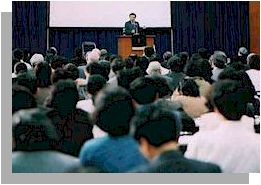|
||
[ 2 / 4 page] |
||
Japanese elite group training |
||
If we look at history, we can clearly understand how this "education to remedy children's weaknesses" started. With the belated advent of modernization in the Meiji era, as Japan turned its attention especially to the economy, we struggled under the slogan "passing the West after catching up with it," based on orders from the top. Elite group education started to cultivate the people who were quick at learning and quick at understanding foreign languages, and who could also establish the Japanese economic system while absorbing the knowledge of other countries.
|
||
| This was a great loss to Japan in light of the fact that the
revolutions brought about the maturity of individual human beings.Thanks to elite group
education, Japan achieved rapid economic growth and came to be ranked with other great
powers. Although Japan lost the war because it had too high an opinion of itself, Japan's defeat brought with it an opportunity to make a fresh start and gave
the public power. The Constitution was created in an admirable attempt to create a nation
governed by the power of the people. On the economic front, Japan "passed the West after catching up with it" because Japan was on the brink of economic devastation in the
immediate post-war era. Human resources and capital were put intensively into specific
bedrock industries such as, first, ships, then, autos. It is known as "economy for economy's sake." This
contributed to staggering economic growth in the post-war period, the 20s, 30s and 40s of
the Showa era (mid-'40s to mid-'70s). We have to admit that, in light of Japanese growth, it was the right track for Japan to follow. Accordingly, education at that time was oriented toward nurturing the elite group. Those who were talented with a good memory and were quick to learn various subjects were in great demand. To create new things by racking their brains was not required under the "passing the West after catching up with it" system. Companies employed obedient and bright people en masse. This was probably due to the idea that because only the elite group led the company to become a driving force behind the Japanese economy, companies could employ people with average ability for the rest of workforce and could lump them together. A stratified school system was created based on a criterion called "deviation value" with Tokyo University at the top of the heap of the entire education system. Every child and parent strained to climb up a little higher. Parents encouraged children to study harder. As for the children, they vied with one another. This seems to have been a feature of 30 years of the Japanese post-war era.
|
||

